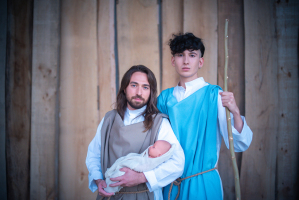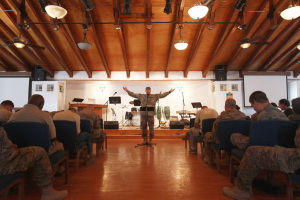Study: Americans Not All Flocking to Bigger, Contemporary Churches
Most Americans change churches throughout their lives, but a new study shows that they are not flocking toward one particular house of worship. The American religious landscape remains diverse and not one worship style or form of church emerges as the dominant choice for the country's faithful.
"The findings show a lot of individual change, but not a lot of broad trends," said Ron Sellers, president of Ellison Research. "Most people go to a place of worship that's a different size, but there's no strong trend toward finding smaller congregations or larger ones. There's also a lot of change in worship styles, but not a big overall trend toward going someplace more contemporary or more traditional."
In a study of over 1,000 American adults, released Monday by Ellison Research, 69 percent of all Americans who currently attend worship services have attended more than one place of worship - which includes churches, temples, or houses of worship - as an adult. Only 31 percent say their current place of worship is the only one they have regularly attended since age 18.
When changing where they worship, not all opt for a bigger congregation or a more contemporary worship style.
When choosing size, Americans are nearly evenly divided between a larger or smaller congregation. Forty-three percent of American Protestants have moved to a larger congregation and 45 percent switched to a smaller one. Just 11 percent switched to a place that is about the same size of the place they left.
Only 31 percent of Protestants say their current church has a more contemporary worship style while 42 percent say their new church is more traditional in worship.
Sellers believes the study results challenges common perceptions that Americans are abandoning traditional worship and small churches.
"With the rise of megachurches over the past few decades, and the increase in the use of contemporary forms of worship such as rock music, drama, or the folk mass, two common concerns are that traditional forms of worship are dying out, and that small churches may become a vanishing breed. There has been a slight trend toward more contemporary worship styles among people who switch where they worship, but certainly not a wholesale move away from traditional styles," Sellers commented.
"And there has been just as much movement toward smaller congregations as toward larger ones," he added. "Observers may worry about people leaving small congregations and going to the megachurches, but they need to realize there are about as many people moving down in size as moving up."
Theologically, 53 percent of adults who changed their place of worship say their current place is about the same as their old one; 28 percent moved to a place that is more theologically conservative; and 12 percent switched to one that is more liberal. Protestants were much more likely than other faith groups to have moved to a place that is theologically different from their old church (52 percent). Only 25 percent of Catholics noted a theological difference between their current and old churches.
Some Americans who went to a different place of worship changed denominations or faith groups, including 37 percent of all adults and 44 percent of Protestants.
While the study did not focus on why people moved to another place of worship, it did find that in a majority of cases, Americans switched to find someplace closer to home.
"This research shows what people are changing, but it doesn't address why," Sellers cautioned. "One person might change to a much smaller church or temple without size being a significant factor in their choice, while another person can consciously decide they want to move to someplace smaller and more intimate. This research shows what is happening out there, but it's not accurate to pinpoint any of these changes as motivating factors when people switch where they worship."



























